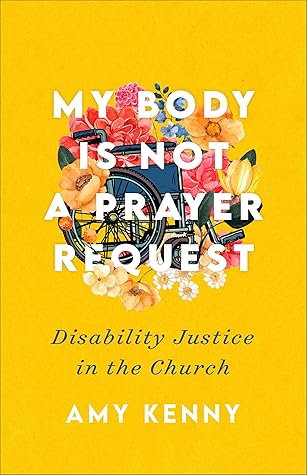More on this book
Community
Kindle Notes & Highlights
by
Amy Kenny
Read between
May 10 - May 12, 2024
To assume that my disability needs to be erased in order for me to live an abundant life is disturbing not only because of what it says about me but also because of what it reveals about people’s notions of God. I bear the image of the Alpha and the Omega. My disabled body is a temple for the Holy Spirit. I have the mind of Christ. There’s no caveat to those promises. I don’t have a junior holy spirit because I am disabled. To suggest that I am anything less than sanctified and redeemed is to suppress the image of God in my disabled body and to limit how God is already at work through my life.
...more
Disability acts as a method for revealing the living God to the community, not something that always needs to be prayed away to showcase God’s power.
Almost all of the chapter focuses on what happens after Zach receives sight. If it were just about the physical cure, the story would end after verse 7 when he reemerges from the pool, able to see.
Jesus’s ministry is not all about a physical cure but about holistic healing.
Folks in Jesus’s day thought about healing in much broader terms. They talked about healing as restoring relationships and integrating someone back into social and religious systems.5 The Greek word often used in Scripture for healing is sozo, which means “to make whole” or “to save.”6 It’s the same word used to talk about salvation.
Curing is a physical process; it’s individual, usually (fairly) rapid, and concentrates on eliminating disease. Healing is a sociocultural process. It focuses on restoring interpersonal, social, and spiritual dimensions. It’s lengthy and ongoing because it’s a process of becoming whole.
The goal of healing isn’t fixing, but restoring. It’s a transformative process that seeks to make someone whole. Healing is not about erasing the experience of trauma (which I’m pretty sure is impossible) but about processing it and coming to terms with it, no matter how heavy it might be to carry.
Capitalism likes to attach products to warm and fuzzy feelings to dupe us into believing that we can charge our happiness to a credit card. But healing is not a product that can be bought or sold.
As prophet Rachel Held Evans notes, “there is a difference between curing and healing, and the church is called to the slow and difficult work of healing. We are called to enter into one another’s pain, anoint the sick, and stick around, no matter the outcome,” even when it makes us uncomfortable.
When we are young and nondisabled, it’s easy to buy into the myth that we are in control of our bodies, even though we know deep down that we are not.
Ableism is “a system that places value on people’s bodies and minds based on societally constructed ideas of normalcy, intelligence, excellence, and productivity.”2 It claims that some bodies are better than others. It values people only for what they produce. It suggests our résumés and our GPAs are more important than our humanity. It withholds belonging until we prove we are worthy of it.
Ableism is not a character trait, an identity, or an illness. It is a system that starts with a philosophy. The Western philosophy of Aristotle, to be precise. Aristotle claimed that disabled people lacked reason and therefore were subhuman. His hierarchy of humanity has been used as the basis for racist, sexist, and ableist philosophies that are still pervasive today.3
People have been taught to value product over personhood, profit over people, and cash as king above all else. Disabled people do not produce anything the capitalist market deems valuable, and therefore we are cast aside as drains on the system. It’s eugenicist, but that’s capitalism.
“If you are silent about your pain, they’ll kill you and say you enjoyed it,” Zora Neale Hurston taught us.10 But I wasn’t silent about it. They just didn’t believe me.
People want to understand something to believe it’s real.
We forget that rest is good for us. Rhythms of rest help our bodies and minds rejuvenate. Regular rest reduces stress, shrinks the risk of heart disease, boosts our immune system, and deepens our creativity. Study after study confirms what we already know: rest is exactly what the Great Physician ordered.
As Walter Brueggemann notices, “Members of the remnant community have no investment in the present world and not only do they not benefit from the system, but they are glad to see it go, given their deep confidence that Yahweh will have for them a better future.”


